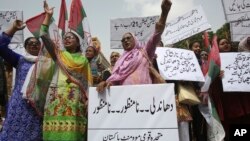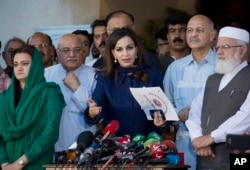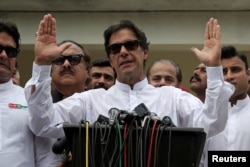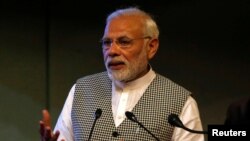A week after Pakistan went to the polls and the party of internationally renowned cricketer-turned-politician Imran Khan claimed victory, questions continue to rise over the fairness and transparency of the polling process.
Leaders of some of Pakistan's largest political parties gathered with several other parties in capital Islamabad Thursday to denounce the elections as rigged. Still, they said they would join the parliament and field their own candidate against Khan for prime minister.
"We reject the results of these elections as well as this Election Commission," said Sherry Rehman, a senior leader of the Pakistan People's Party, the party of slain prime minister Benazir Bhutto. "We will continue protesting these results both inside and outside the parliament."
Military's influence
The parties allege the Election Commission of Pakistan (ECP) was in cahoots with the powerful military to help candidates of Khan's PTI win in polls. Around 370,000 military personnel were assigned to provide protection during the polling process.
However, candidates from various parties complained that some of them overstepped their mandate and illegally interfered in the vote counting process.
"In several places our polling agents were thrown out, and in many places the military officers bypassed the [civilian] presiding officers and became the law enforcing authorities. They did not follow the laws of the election commission," said human rights activist Jibran Nasir, who ran as an independent candidate in Karachi.
The ECP claims the elections were free and fair but a breakdown of a newly introduced electronic system designed to transmit the results faster led to a delay in announcing the results, leading to misperceptions of irregularities.
Pakistan's military denies allegations of wrongdoing. In a Tweet following the elections, military spokesman Major General Asif Ghafoor thanked his fellow Pakistanis for their support.
"U hv rejected all kinds of malicious propaganda. We are strong because we have your unflinching support," he tweeted, adding "Pakistan wins again!"
Protests across country
Khan, for his part, announced in his victory speech that he would support any efforts to recount the ballots in constituencies where rigging was suspected. Members of his party also claimed those who lost in the polls were trying to muddy the water through these allegations.
Meanwhile, some of the smaller parties have continued protest rallies in various parts of the country. Earlier this week, a Pashtun nationalist party called the Awami National Party (ANP), along with some others, held major protests in Mansehra and Charsadda, two cities in the Khyber Pakhtunkhwa (KPK) province.
Social media posts showed city squares full of people, mostly men. The throngs filled not just the streets but also the walls or roofs of surrounding buildings. Still, the protests were not shown on Pakistan's otherwise vibrant electronic media.
Several sources inside Pakistan's media industry confirmed that there was pressure from Pakistan's intelligence agency, the ISI, to censor coverage of rigging allegations or protests against irregularities in the elections, especially if fingers were pointed towards the military.
WATCH: Allegations of Rigging, Censorship Haunt Khan's Party of 'Change'
On Tuesday, a press conference by Maulana Fazlur Rehman, a leader who represents an alliance of Islamist parties the Muttahida Majlis e Amal (MMA), was taken off air from all TV channels when he started discussing alleged rigging in the polls.
In his column published in the Urdu daily Jang newspaper, journalist Saleem Safi wrote that on the eve of the elections, his television channel Geo News failed to air reports of polling irregularities coming from its own teams around the country.
Safi, who was part of the live election transmission, said his own efforts to report any irregularities were thwarted.
"When I read on air complaints that I had received on my phone from various parts of the country, so much pressure was put on the management that I was forced to leave the panel," Safi wrote.
The next day, he was again forced to leave the live transmission.
"The moment I started talking about the irregularities in the counting process, the channel started receiving threats that it would be shut down," he wrote.
Austere oath-taking
Meanwhile Khan, who has already received messages of felicitations from various foreign leaders, including Indian Prime Minister Narendra Modi, has announced he wants an austere oath-taking ceremony without any pomp and show. He has also announced he would not be inviting any foreign leaders to the ceremony, putting to rest rumors that Modi might attend.
A PTI spokesman announced on the party's official Twitter account that his party felt no threat from an opposition that was "void of legitimacy or ideas" and did not have the numbers to beat them in parliament.
Several smaller parties as well as independent candidates, including some who originally complained of rigging in the elections, have since announced they will join PTI on the treasury benches.



